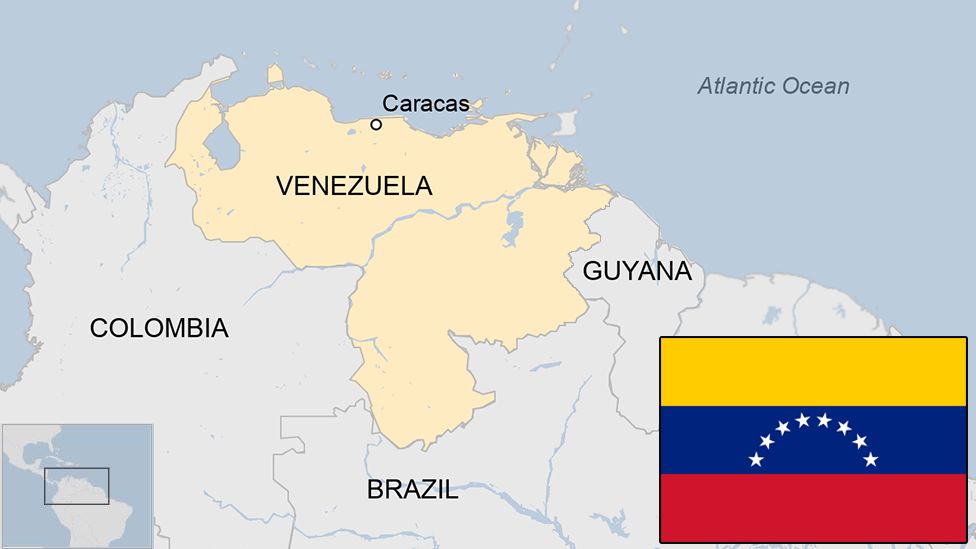Venezuela country profile
- Published

Venezuela is one of the most highly-urbanised countries in Latin America. It has some of the world's largest proven oil deposits as well as huge quantities of coal, iron ore, bauxite and gold.
It has been one of the world's leading exporters of oil but the country experienced poor economic management in the early decades of the 21st Century.
Former president Hugo Chavez, who died in 2013, styled himself a champion of the poor during his 14 years in office, pouring billions of dollars of Venezuela's oil wealth into social programmes.
The government of his successor, Nicolas Maduro, has had to struggle with plummeting oil prices and an economic and political crisis that has left Venezuela in a state of near-collapse.
The country struggles with rampant inflation, goods shortages, unemployment and crime. Seven million Venezuelans have fled abroad to neighbouring states.
The country is involved in a long-running border dispute with neighbouring Guyana over Essequibo, a disputed oil-rich territory that Guyana, and British Guiana before it, have administered since 1899.
- Read more country profiles - Profiles by BBC Monitoring
BOLIVARIAN REPUBLIC OF VENEZUELA: FACTS
- Capital: Caracas
- Area: 916,445 sq km
- Population: 29.7 million
- Languages: Spanish, plus regional languages
- Life expectancy: 67 years (men) 76 years (women)
LEADERS
President: Nicolas Maduro
President Nicolas Maduro has governed since March 2013, following the death of his mentor Hugo Chavez.
He was re-elected president for a second six-year term in May 2018, in a poll marred by an opposition boycott and claims of vote-rigging.
At the time, Venezuela was in the throes of a deep economic crisis, with rampant inflation and lack of basic necessities, despite boasting huge oil reserves.
Mr Maduro failed to undertake any significant reforms of the state-run economy, and established a Constituent Assembly to bypass the National Assembly and strengthen his grip on power.
MEDIA
Venezuela's political polarisation is mirrored in the media.
State TV coverage routinely ignores the opposition. Critical and exile media operate online.
Many journalists have fled because of threats and physical dangers, says Reporters Without Borders.
The government and its opponents use social media as a battleground.
- Read full media profile
TIMELINE
Some key dates in Venezuela's history:
1498-99 - Christopher Columbus and Alonso de Ojeda visit Venezuela, which is inhabited by Carib, Arawak and Chibcha peoples.
1521 - Spanish colonisation begins.
1749 - First rebellion against Spanish colonial rule.
1810 - Venezuelans take advantage of Napoleon's invasion of Spain to declare independence.
1829-30 - Venezuela secedes from Gran Colombia.
1870-88 - Ruler Antonio Guzman Blanco attracts foreign investment, modernises infrastructure and develops agriculture and education.
1889 - Venezuela lays claims to two-thirds of Guyana west of the Essequibo river, but international arbitration rules in favour of Guyana in 1899.
1908-35 - Under dictator Juan Vicente Gomez, Venezuela becomes world's largest oil exporter.
1945 - Coup establishes civilian government after decades of military rule.
1948 - President Romulo Gallegos, Venezuela's first democratically-elected leader, overthrown within eight months in military coup led by Marcos Perez Jimenez.
1958 - Admiral Wolfgang Larrazabal ousts Marcos Perez Jimenez; leftist Romulo Betancourt of the Democratic Action Party (AD) wins presidential election.
1964 - Venezuela's first presidential handover from one civilian to another takes place when Raul Leoni is elected president.
1973 - Venezuela benefits from oil boom and its currency peaks against the US dollar; oil and steel industries nationalised.
1989 - Carlos Andres Perez elected president amid economic depression, launches austerity programme with IMF loan. Riots, martial law and general strike follow, with hundreds killed in street violence.
1992 - Colonel Hugo Chavez and supporters make two coup attempts. Some 120 people killed in suppression of coups, Col Chavez jailed for two years before being pardoned.
1998 - Hugo Chavez elected president amid disenchantment with established parties, launches the 'Bolivarian Revolution'. He adopts socialist and populist economic and social policies funded by high oil prices, and a vocal anti-US foreign policy.
2005 President Chavez brings in land reform to eliminate Venezuela's large estates and benefit rural poor. Ranchers say it is an attack on private property.
2006 - Venezuela signs a $3bn arms deal with Russia, moving away from US arms supplies. Chavez wins a third presidential election.
2012 - Government extends price controls on basic goods in the battle against inflation. Venezuela becomes a full member of regional trading bloc Mercosur. Chavez wins a fourth term in office.
2013 - Chavez dies at age 58 after a battle with cancer. His chosen successor Nicolas Maduro is narrowly elected president amid an imploding economy and a divided nation.
2018 - UN Secretary General Antonio Guterres chooses to have the International Court of Justice (ICJ) consider Venezuela's long-running claim that the 1899 ruling on the border between Venezuela and Guyana is invalid.
2019 - Opposition leader Juan Guaidó declares himself interim president, and asks military to oust President Maduro saying the 2018 election was rigged. EU, US and most Latin American countries recognise Mr Guaidó.
2020 - Opposition boycotts legislative elections, which are duly won by President Maduro's party and allies.
2023 - UN says more than seven million Venezuelans have fled the country.
The International Court of Justice rejects Venezuela's objections it is not the right body to rule on the long-running border dispute between Guyana and Venezuela over Essequibo and says it will now rule on the issue.
Venezuelans overwhelmingly back the country's claim to Essequibo in a referendum and approve establishing a new Venezuelan state in the area.
Related Topics
- Published14 February 2023
- Published11 September 2023
- Published11 September 2023
- Published24 April 2023
- Published11 December 2023
- Published2 June 2023